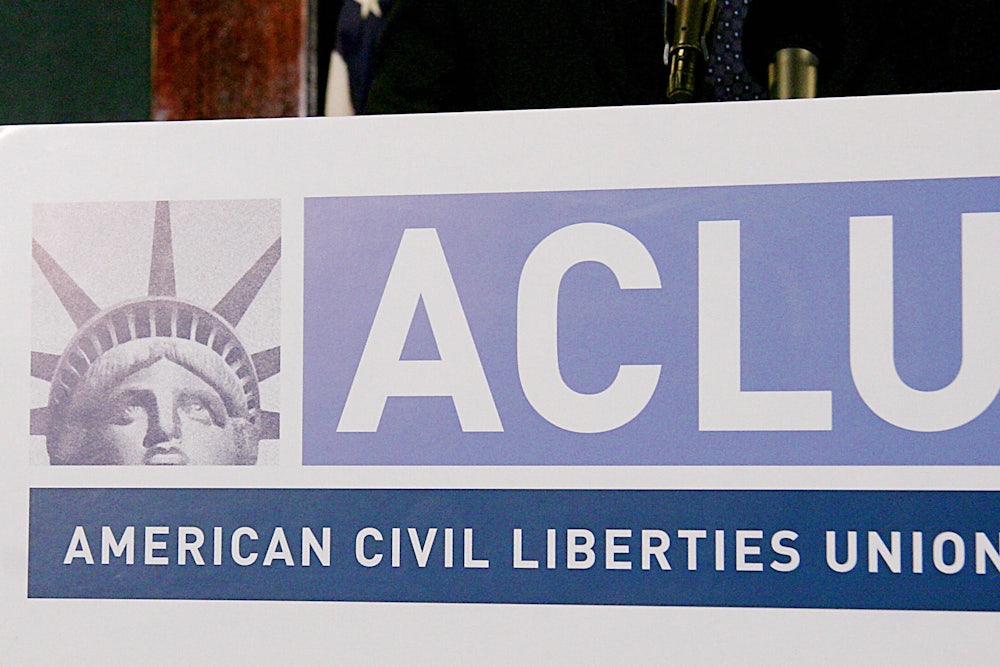On Monday, Liel Leibovitz wrote a piece at Tablet calling out the ACLU for its stance on the Israel Anti-Boycott Act, a recently proposed measure that would make it a felony for Americans to support the international boycott against Israel. Infractions would result in a minimum civil penalty of $250,000 and a maximum criminal penalty of $1 million and 20 years in prison. In response to this bill, the ACLU sent a letter to the Senate, writing, “We take no position for or against the effort to boycott Israel or any foreign country, for that matter. However, we do assert that the government cannot, consistent with the First Amendment, punish U.S. persons based solely on their expressed political beliefs.”
In response, Leibovitz writes:
It’s hard to tell how the ACLU arrived at its conclusions—a request for an interview with the group went unanswered. It’s harder still, reading the bill, to imagine how anyone might interpret its strict commercial confines to a restriction of an individual’s right to free speech. But anyone seeking clues as to what might be guiding the ACLU in its recent venture would do well to inquire after the letter’s signatory, the organization’s national political director, Faiz Shakir.
It’s actually quite easy to see how someone would interpret the bill as restricting an individual’s right to free speech. As David Cole and Shakir write in The Washington Post:
“The bill threatens severe penalties against any business or individual who does not purchase goods from Israeli companies operating in the occupied Palestinian territories and who makes it clear—say by posting on Twitter or Facebook—that their reason for doing so is to support a U.N.- or E.U.-called boycott. That kind of penalty does not target commercial trade; it targets free speech and political beliefs. Indeed, the bill would prohibit even the act of giving information to a U.N. body about boycott activity directed at Israel.”
But Leibovitz does not delve into the substance of his claim, nor does he address anything specific in ACLU’s letter or in Cole and Shakir’s op-ed. Instead, the rest of the piece is dedicated to taking down Shakir, a Muslim, for, as Leibovitz claims, “taking or defending positions that many considered troublingly anti-Israeli and, at times, anti-Semitic.” Leibovitz cites Shakir’s time as the editor-in-chief at ThinkProgress, an arm of the Center for American Progress. The Intercept’s Ali Gharib (a former employee of Shakir’s) has a detailed tweetstorm taking down Leibovitz’s personal attacks on this matter:
As anyone in a position to know could have told Liel, there are simply no examples of Faiz 'defending or taking' any bigoted positions.
— Ali Gharib (@Ali_Gharib) August 7, 2017
The ACLU’s Ben Wizner also responded to the piece in the following statement:
These unjustified allegations are meant to distract from the merit of the ACLU’s well-founded legal analysis of the legislation. The ACLU has actively defended the constitutionality of boycott activity for many decades. While Faiz signed our recent letter as the director of our legislative office, the legal analysis of the congressional bill has been led by our New York-based free speech attorneys, whom I oversee. Any suggestion that Faiz influenced our longstanding legal position on these questions, or on this specific bill, is absurd. Any suggestion that he is anti-Semitic is deeply offensive and wrong.
As Wizner points out in his statement, the ACLU has defended the constitutionality of boycotts long before Shakir even started at the organization in 2017. The ACLU has an established history of free speech advocacy, famously defending the right of neo-Nazis to march in Skokie, Illinois, in 1978. Leibovitz himself points to Skokie as an example of the organization’s “principled impartiality,” which he does not extend to the ACLU’s position on the anti-boycott law.
As Shakir told Vox’s Jeff Stein back in December, when Keith Ellison, a Muslim-American, was facing his own smear campaign as he ran for DNC chair, “If you’re a Muslim in politics, you’re operating under a constant and inherent initial skepticism—there’s this cloud over your head that’s ready to pour down rain on you if you have the most minor misstep, or none at all. That’s what Keith is dealing with now: the Islamophobia that puts Muslims in public life under suspicion without cause.” Shakir could very well have been talking about himself today.
